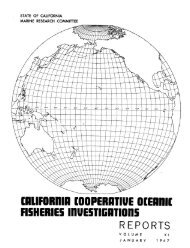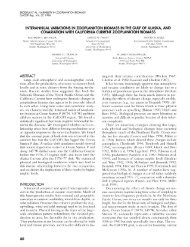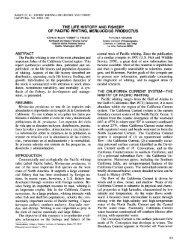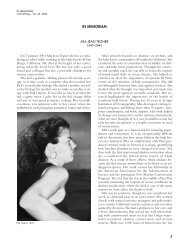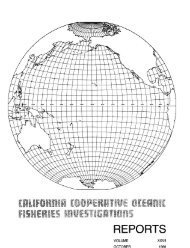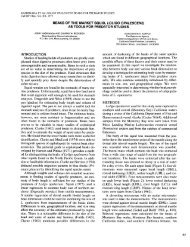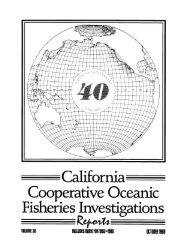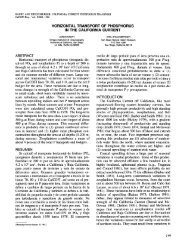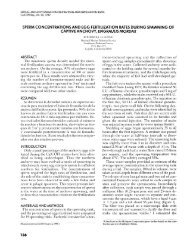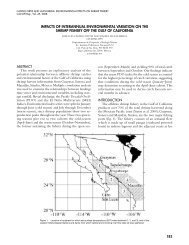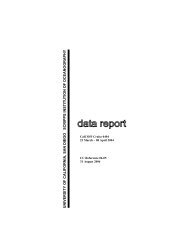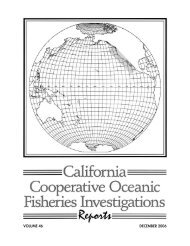CalCOFI Reports, Vol. 23, 1982 - California Cooperative Oceanic ...
CalCOFI Reports, Vol. 23, 1982 - California Cooperative Oceanic ...
CalCOFI Reports, Vol. 23, 1982 - California Cooperative Oceanic ...
You also want an ePaper? Increase the reach of your titles
YUMPU automatically turns print PDFs into web optimized ePapers that Google loves.
CLARK: CALIFORNIA MARINE FISHERIES INVESTIGATIONS. 1914-39<strong>CalCOFI</strong> Rep., <strong>Vol</strong>. XXIII, <strong>1982</strong>much discussion and final realization that the thing todo was to learn to work together and fuse the twoprograms so they would not overlap, but supplementeach other. Thus with all the pangs, finally <strong>CalCOFI</strong>was born. It rapidly became a very lusty infant.Also, in December of 1935 the N.B. Scofield researchvessel was launched. This is the only time the<strong>California</strong> Department of Fish and Game has evernamed one of its boats for anything but a fish, but itwas certainly a wonderful tribute to the work that N. B.had done. In 1939 the N.B. Scofield made six cruises,traveled 16,000 miles from northern <strong>California</strong> toCentral America, and took albacore 800 milesoffshore. In the fall of 1939 N.B. Scofield retired, andhere ends my account of the first twenty-five years offisheries investigation.* * *Question: Tell us something about what you did,Frances.Clark: I came to work for the Department of Fish andGame in 1921, shortly before the move into the StateFisheries Laboratory. I stayed through to 1922, whenpeople left because of lack of funds. I went to theUniversity of Michigan to study for my doctorateunder Alexander Ruthven and Carl Hubbs. I returnedto the <strong>California</strong> Department of Fish and Game as afisheries biologist in 1926 and continued on until Iretired in 1957.Here is a little anecdote about the beginning. I hadan A.B. in biology from Stanford but was hired as asecretary and librarian. I had a very limited knowledgeof shorthand; I knew nothing about library work. But Ifortunately found that Thompson apparently didn’tcare to dictate letters, and he asked me if I wouldrather have him dictate or write the letters myself forhim to sign. That was much more fun. For two momingsa week I went into Los Angeles to a library schooland learned the rudiments of library work, and in thatway the extensive library developed by Pat Powell gotunder way.Question: I’d like to ask you, Dr. Clark, what was thepublic’s reaction to the factory ships offshore?Clark: I have a feeling that, aside from the fisheriespeople and the industry, people didn’t pay much attention.It was not a major <strong>California</strong> problem. As youprobably know, they did pass a law that fish meal andoil processed outside of <strong>California</strong> waters could not bedelivered at <strong>California</strong> ports. This, in part, shut downthe offshore fish processing. But the thing that reallystopped it was employment. The people who wereworking on the ships offshore worked twenty-fourhours a day; the union said that they could not worklonger than eight hours a day, and the wages had to beincreased. That financially broke the reduction ships,and they had to give up.Question: Through your career did you face any discrimination?I assume at that time you were one of thefew women working in the field of fishery biology.Clark: My personal experience is not that peopledidn’t want to employ women, they just never thoughtof doing so!Blanca Rojas de Mendiola: I am from the Institutodel Mar de Perk I want to tell something about Dr.Frances Clark. She was in Peni in 1953 and in thebeginning of 1954. We learned a lot from her, and allof the people who had the opportunity to work withher at that time appreciate it.28



